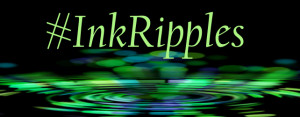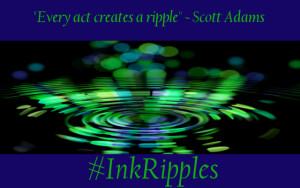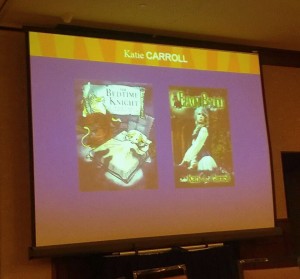
Every month when it’s time to start thinking about the new #InkRipples topic, I say to myself, “You are not going to write about books,” and then I end up somehow connecting the topic back to books. And February’s topic of chocolate is no exception.
It’s not my fault. See writers are infamous for turning to chocolate in dark times (say when we’re working through a tough revision, or are facing  writer’s block, or are afraid to look at our inboxes because of an influx of rejections). It’s bound to turn up in our writing.
writer’s block, or are afraid to look at our inboxes because of an influx of rejections). It’s bound to turn up in our writing.
Whenever I think of chocolate in books, I think of J.K. Rowling’s masterful use of it in the Harry Potter series (really, is there anything that woman is not masterful at?!). There is no shortage of pieces written about chocolate in Harry Potter, from the Harry Potter Wiki page to the Pottermore website itself. In short, chocolate is used to used to ward off the depressive effects of Dementors. But it’s also used for fun, with the many magical confections Rowling invents for wizards (care for a Chocolate Frog, anyone?).
Chocolate is actually a pretty magical food, even for us muggles. Dark chocolate in particular acts as a mood booster, is an anti-inflammatory, is full of antioxidants, and is fiber-rich (see “10 Ways Giving In To That Chocolate Craving Can Benefit Your Health”).
I guess what I’m trying to say is please send me all the chocolate!
 #InkRipples is a monthly meme created by me, Mary Waibel, andKai Strand. We pick a topic (February is all about chocolate), drop a ripple in the inkwell (i.e. write about it on our blogs), and see where the conversation goes. Be sure to check out Kai’s and Mary’s posts this month. We’d love to have you join in the conversation on your own blogs. Full details and each month’s topic can be found on my #InkRipples page.
#InkRipples is a monthly meme created by me, Mary Waibel, andKai Strand. We pick a topic (February is all about chocolate), drop a ripple in the inkwell (i.e. write about it on our blogs), and see where the conversation goes. Be sure to check out Kai’s and Mary’s posts this month. We’d love to have you join in the conversation on your own blogs. Full details and each month’s topic can be found on my #InkRipples page.




















